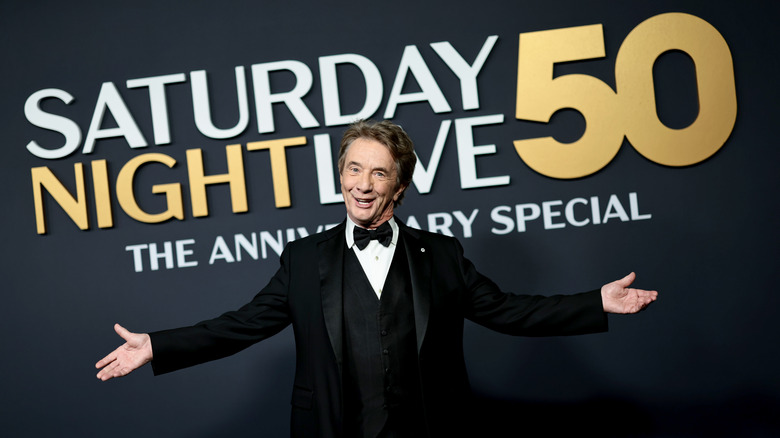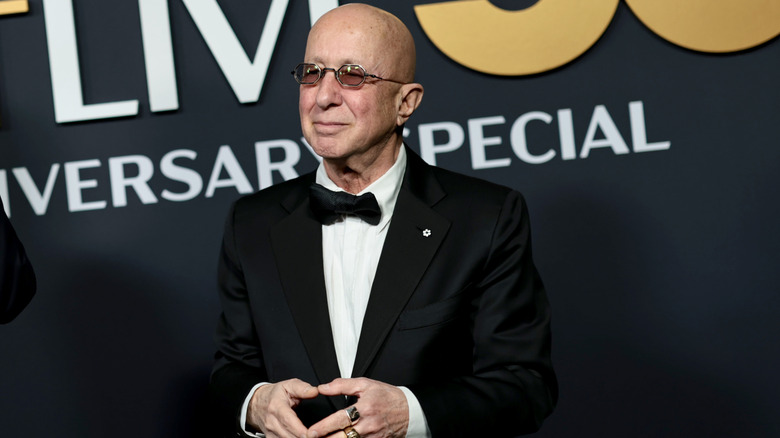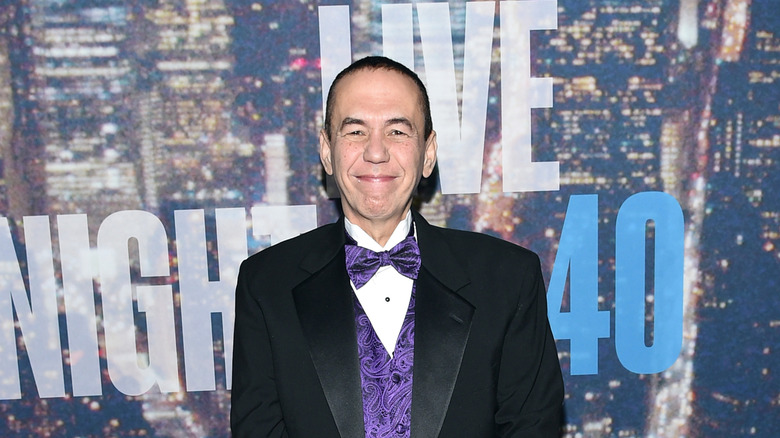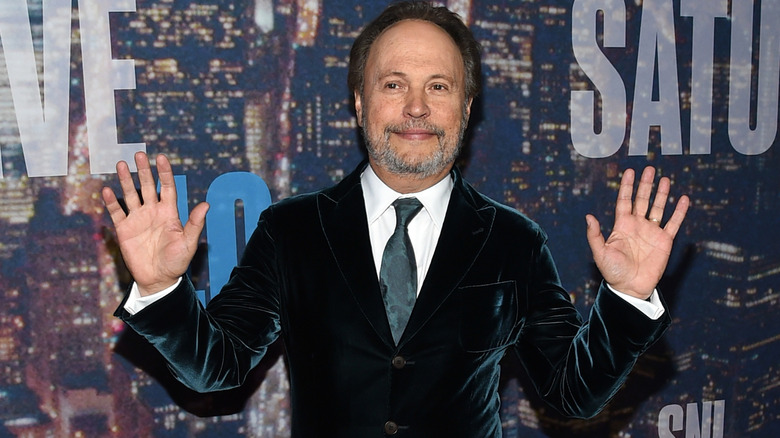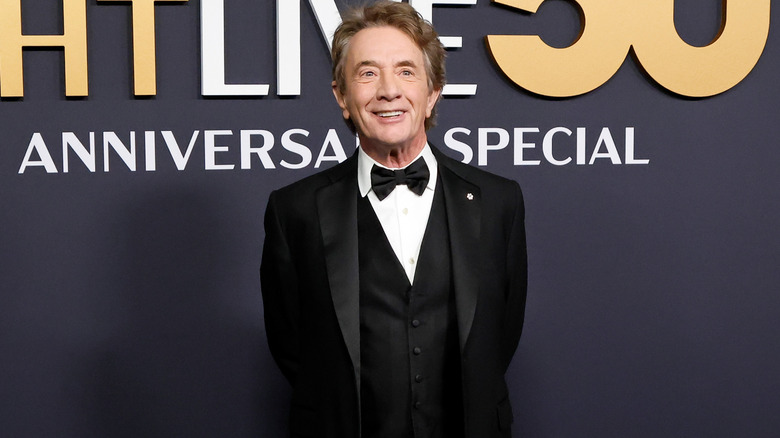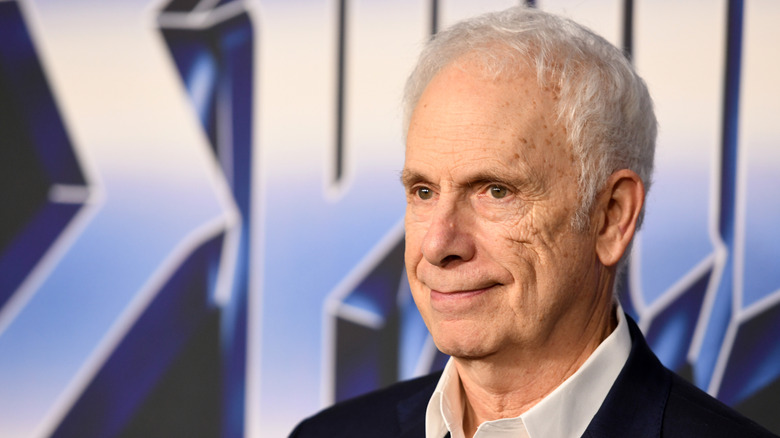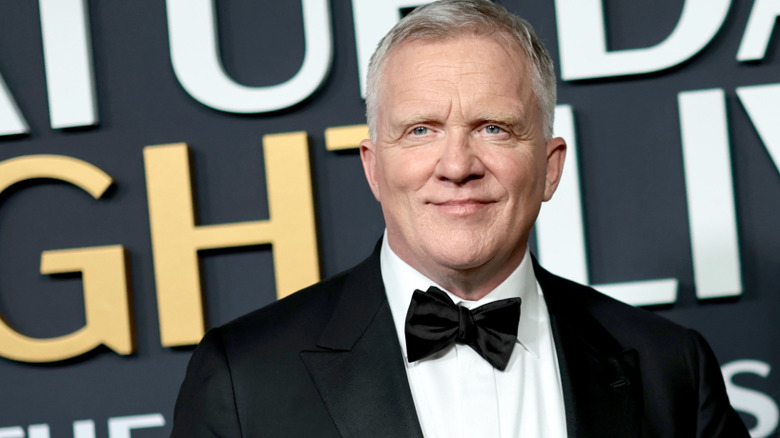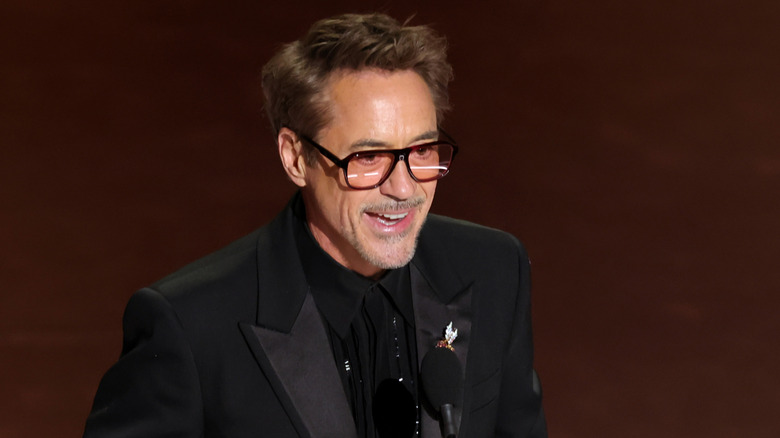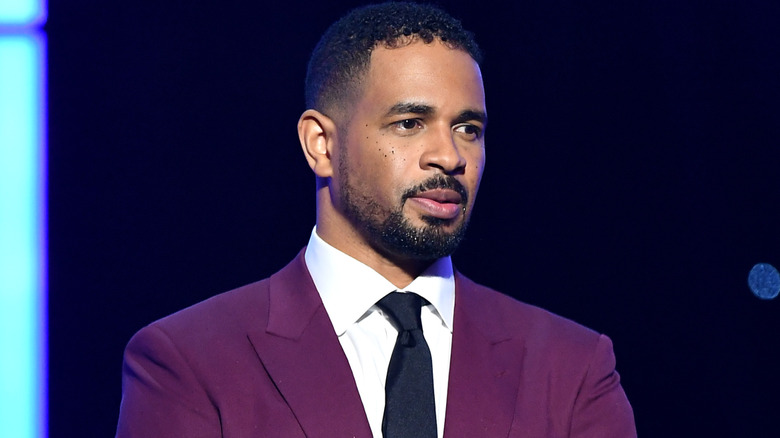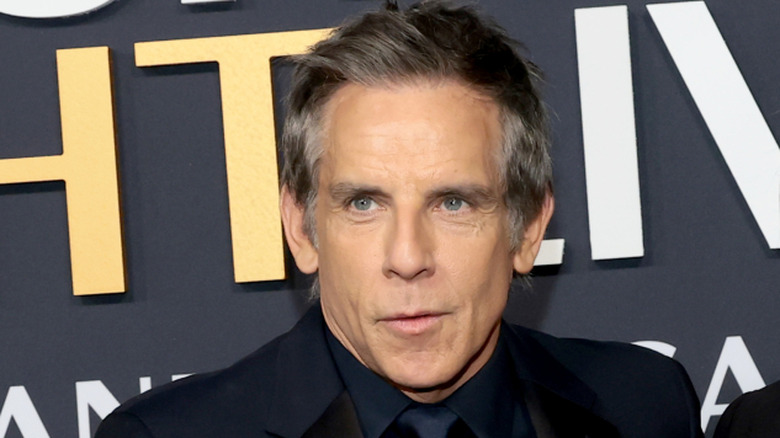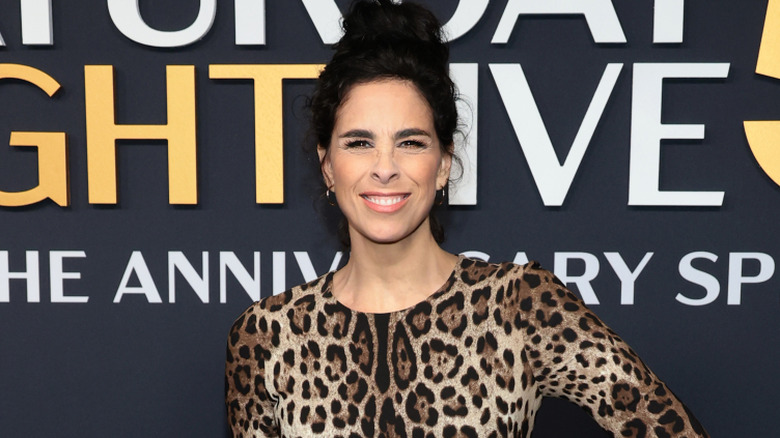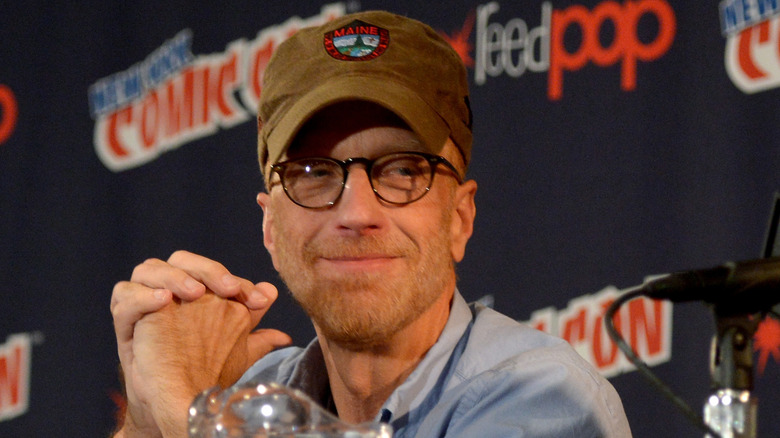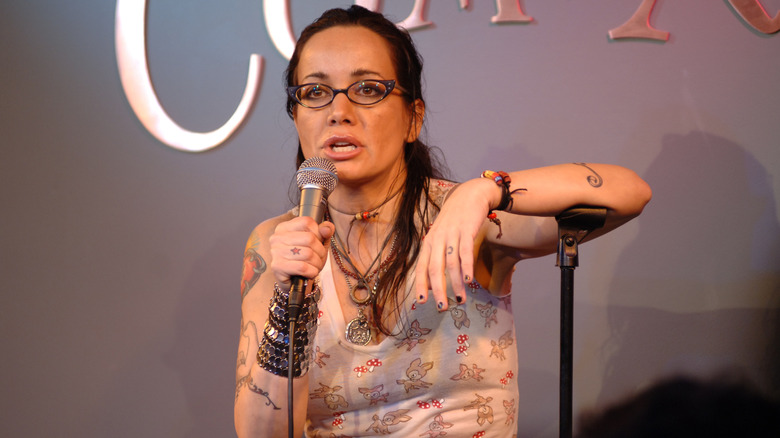You Forgot These SNL Stars Were Only On One Season
We may receive a commission on purchases made from links.
"Saturday Night Live" celebrated 50 years on the air in 2025, and with its myriad cast members and high turnover rate, it's easy to forget some of the famous faces who appeared for just one year. While the live sketch comedy show hasn't produced many megastars recently, and arguably hasn't been as culturally dominant in years, there was a time when "SNL" churned out Hollywood stars like a fame factory.
Bill Murray, Eddie Murphy, Chris Rock, Kristen Wiig, Adam Sandler, Will Ferrell, Tina Fey, Jimmy Fallon, Seth Meyers, Amy Poehler, Tracy Morgan, Norm MacDonald, and many more A-listers emerged from the late-night laughter of "SNL." Unlike those celebrities, there are quite a few big names that have been attached to the NBC show for just a single season, barely lasting a year (or just four weeks, in one case). Though some of these momentary "SNL" stars immediately crash and burn, many of them have gone on to bigger and better things.
Paul Shaffer (1979)
Before Paul Shaffer became David Letterman's sidekick of sorts and musical director of his late-night TV show for 33 years, he was a rising talent in the comedy and music scene. At the young age of 22, Shaffer was hired as the musical director for the Toronto production of "Godspell" in 1972, and his co-stars included future "Saturday Night Live" cast members Gilda Radner and Martin Short (along with Eugene Levy, Dave Thomas, and others in the comedy scene). This would bring Shaffer into the same scene as Lorne Michaels, who then hired the musician as one of the first members of the "Saturday Night Live" house band when the show premiered in 1975.
While Shaffer was hired as a keyboardist for "SNL," he actually began appearing in the show, usually in a musical capacity. When Bill Murray took on the Nick the Lounge Singer character, Shaffer played piano in the background; he also portrayed music mogul Don Kirshner. He became musical director of "SNL" in 1978 and a featured player for the show in 1979, making him the only member of the house band to become a full-time cast member of the show.
Shaffer made history when he became the first person to say "f***" on "SNL." Appearing on "The Kenny Aronoff Sessions" podcast in 2024, Shaffer recalled, "It was an absolute mistake because it was a little improv," adding, "My face went white. I've seen the tape. Just, 'Oh my God, what have I done?' ... And when Lorne Michaels came over, he said, 'Well, you just broke down the last barrier.'" Unlike future cast members, Shaffer was not fired for saying the word, instead leaving in 1980. He teamed up with Letterman in 1982, and the rest is history.
Gilbert Gottfried (1980)
"Saturday Night Live" experienced a massive shake-up when creator Lorne Michaels left the show for its sixth season in 1980, taking its cast and most of the writers with him. Associate producer Jean Doumanian was hired to run the show, but fired after 12 episodes, and the season ended prematurely when a writer's strike shut things down. It was a mess of a season, but cast member Gilbert Gottfried was considered a bright spot in the show, even though he was underused in the season.
Gottfried appeared sparsely throughout Season 6, impersonating filmmaker Roman Polanski and politician David A. Stockman, and portraying a talk show co-host. According to Vulture, the writers accused him of withholding his funniest material and impressions, hoarding them for his own stand-up routine instead of using them on "SNL."
"I didn't like the writers and the writers hated me," Gottfried admitted on "The Joe Rogan Experience." The writers disliked him so much that, for a sketch involving a funeral, they cast him as the corpse. "I just had to lie there in the coffin," he said, elaborating on how he found the whole "SNL" environment to be toxic. "Everybody was, like, at each other's throats, and it just wasn't fun. They were always, like, just hamstringing each other, always trying to f*** each other over," Gottfried said, adding, "I didn't have a great time at all." He was fired alongside several other members of the cast when Dick Ebersol took over from Doumanian.
Billy Crystal (1984)
Producer Dick Ebersol tried to reinvigorate "Saturday Night Live" for Season 10. He tapped big names with contracts that only required one year of involvement, allowing comedians to try the show out without a lot of pressure and commitment. Among the fresh faces who joined in 1984 was Billy Crystal, who actually already had a history with the show.
Believe it or not, Crystal was supposed to appear in the very first episode of "SNL," on October 11, 1975. His piece was purportedly too long; once shortened, it was moved to the end of the show, which supposedly annoyed his managers, who pulled him out of the whole thing. Lorne Michaels then offered him a role in the cast, which Crystal recalled in the book "Live From New York," saying (via Ultimate Classic Rock), "He felt I would do six appearances on the show, and then saw me becoming a host of the show, among other hosts, in two years. They'd be grooming me to be one of the main guys." However, Crystal turned the offer down.
Crystal hosted "SNL" twice in Season 9, in March and May of 1984, before appearing as a cast member when Season 10 premiered on October 6, 1984. His work on the show drew critical praise, with one character in particular entering the cultural zeitgeist with the phrase, "You look marvelous!" Crystal's contract expired, and he went on to become a massive star.
Martin Short (1984)
Aside from Billy Crystal, Season 10 of "SNL" featured several future comedic legends, including Julia Louis-Dreyfus, Harry Shearer, Rich Hall, Jim Belushi, and Martin Short. The latter brought some of the characters with him from his previous sketch comedy show, "SCTV," such as Ed Grimley and Nathan Thurm, and helped revitalize the show. Despite his prior success on that show, Short has said he was perpetually terrified during his run on "SNL," thinking the show would be canceled any week.
"I was terrified every show. I treated it like a special. In fact, during the fourth show, on the Tuesday, I went in to try to quit," Short said during an appearance on "The Tonight Show Starring Jimmy Fallon." While Short managed to last until the season's final episode on April 17, 1985, he nonetheless told Fallon, "It was always nerve-wracking to me." The season finale was also Short's last episode. The real reason he left "SNL" is simple — like Billy Crystal, Short's contract simply expired, and he moved on to bigger and better things.
Christopher Guest (1984)
While Christopher Guest is mainly known as the filmmaker responsible for many beloved mockumentary comedies, such as 2000's "Best in Show" and 2003's "A Mighty Wind," he does appear in front of the camera from time to time. In fact, he had just starred in 1984's comedy masterpiece "This Is Spinal Tap" when he was hired as a cast member for Season 10 of "Saturday Night Live." Along with many characters, Guest made somewhat experimental pre-filmed pieces for the show, anticipating his directing career.
One of Guest's skits for the season has become infamous for all the wrong reasons. Titled "Ballplayers," the October 13, 1984, pre-filmed piece features him and Billy Crystal in blackface, portraying members of the "Negro National League." It's extremely uncomfortable to watch today, and apparently, Guest was uncomfortable on "SNL" at the time, too.
Guest did not enjoy his single year as a cast member on "Saturday Night Live," telling Marc Maron on his "WTF" podcast, "I'd called my lawyer on the Monday and said, 'Can I go home?' He said, 'Probably a little late at this point. It's gonna be hard for you to get out of this.'" While the quality of the show certainly contributed to this feeling, Guest had also just met his future wife at the time, Jamie Lee Curtis, which was likely a distraction.
Anthony Michael Hall (1985)
With so many cast members having signed single-year contracts for Season 10, the 1985 season required a hiring spree. Lorne Michaels, returning after his five-year hiatus, decided to go big and offer "Saturday Night Live" to already established actors rather than stand-up comedians. This included 17-year-old Anthony Michael Hall at the height of his Brat Pack fame; he remains the youngest cast member in "SNL" history.
While Hall was already successful thanks to films like 1983's "National Lampoon's Vacation," 1984's "Sixteen Candles," and 1985's "The Breakfast Club," he was still extremely nervous about "SNL." Hall said there was a lot of pressure to be funny, explaining to Entertainment Tonight, "It was challenging. You're dealing with so much. You have a live audience there; it's like rock and roll, theater, stand-up. It's like everything rolled in one, and I'm just amazed to this day."
Additionally, Hall admitted that the late-night content of the show wasn't always kid-friendly and that the "SNL" writers often just didn't know how to write for a teenager like him. "When I look back I have some memories of it being difficult, I think, for a lot of the writers to figure out how to write for this kid," Hall told Entertainment Tonight. "I think it was a big challenge."
Robert Downey Jr. (1985)
Anthony Michael Hall's co-star in 1985's "Weird Science," Robert Downey Jr., was also hired for Season 11 of "Saturday Night Live." The season would come to be known as "the weird year" due to both its odd sketches that really pushed boundaries and a strange cast that mixed movie stars like Downey, Hall, Randy Quaid, and Joan Cusack alongside controversial young comics Terry Sweeney and Danitra Vance. While Downey may seem like the most successful and confident of them all, he was actually the least savvy of the bunch, something he has readily admitted.
Even though Downey did some serviceable impressions of Elvis Presley, John Mellencamp, and George Michael, he was self-conscious throughout his tenure at "SNL." He eventually came to terms with his limitations, realizing that he wasn't the best fit for the show. "I was somebody ill-suited to rapid-fire sketch comedy," Downey admitted in a 2019 episode of "Off Camera with Sam Jones," adding, "I learned so much in that year of who I wasn't. I was not going to come up with a catchphrase. I was not somebody who was going to do impressions."
Nonetheless, Downey enjoyed the electric feeling of live performance, telling Sam Jones, "There's not a more exciting 90 minutes you can have, whether you're any good or not. It's just amazing." Most of the cast was let go before Season 12, which worked out for Downey, who would of course become one of the biggest movie stars on the planet.
Damon Wayans (1985)
Unlike other "SNL" hires in 1985, Damon Wayans did not have an established career, having only appeared in a funny cameo capacity in the 1984 film "Beverly Hills Cop." In fact, Wayans made his television debut on "Saturday Night Live," a show he said he was born to be on, as he declared in episode four of the docuseries "SNL50: Beyond Saturday Night." Unfortunately, Wayans had a miserable experience on the show.
Wayans said in "SNL50" that his "Beverly Hills Cop" co-star and "SNL" alum Eddie Murphy had advised him (via Deadline), "Write your own sketches. Otherwise, they're gonna give you some Black people s*** to do, and you ain't gonna like it." When the writers refused Wayans' ideas, that's inevitably what happened, and he started pushing back, recalling, "I'm like, 'Hell no.' I said, 'Listen, my mother's gonna watch this show. I can't do this. I won't do this.'"
Eventually, Wayans sabotaged his time at "SNL" by improvising during a sketch called "Mr. Monopoly." Instead of portraying the character as he did during rehearsals, Wayans played the character as a crude gay stereotype. "I snapped. I just did not care. I purposefully did that because I wanted [Michaels] to fire me." Sure enough, Michaels did just that, firing him after 12 episodes. As an olive branch, he invited Wayans back for the season finale to perform stand-up.
Ben Stiller (1989)
Ben Stiller was yet another single-year cast member of "Saturday Night Live" who did not particularly enjoy his time on the show, and it showed. He stood out like a sore thumb among the looser masters of improv comedy featured in Season 14 — Kevin Nealon, Jon Lovitz, Dana Carvey, Nora Dunn, Jan Hooks, Mike Myers, Al Franken, and Victoria Jackson. In fact, Stiller came into the season and only lasted four episodes.
Stiller opened up about his experience on The New York Times' "The Interview" podcast. "It had been my dream to be on 'Saturday Night Live,' but looking back on it, I don't remember exactly how I had the gumption," he admitted, adding that he simply wasn't good at live performance. "I got too nervous," he explained. "I didn't enjoy it and I wanted to be making short films." In fact, it was a short film of Stiller's ("The Hustler of Money") that got Lorne Michaels' attention in the first place.
Stiller would prove more comfortable behind the camera and when acting in things he could control. This became evident immediately after his stint on "SNL," with Stiller moving to MTV for 1990's extremely influential sketch program, "The Ben Stiller Show." Of course, he would go on to direct major comedy films such as 1994's "Reality Bites," 2001's "Zoolander," and 2008's "Tropic Thunder," not to mention the TV show "Severance."
Sarah Silverman (1993)
Years before Sarah Silverman's stunning transformation into an acclaimed stand-up comedian and actor, she was an anxious 22-year-old on Season 19 of "Saturday Night Live." Like Ben Stiller, Silverman typically works best in projects that she has creative control over, such as her beloved, ironic sitcom, "The Sarah Silverman Program." As such, her year on "SNL" wasn't particularly memorable, but her firing certainly was.
"I was so new to the industry, and they were like 'Yeah, you're fired,' and I was in such denial about it — I couldn't believe it," Silverman said on "The Howard Stern Show." She elaborated on how humbling the experience was: "There is just something about it where they just have this energy that puts you in your place where you feel like a piece of s*** and terrified [with] the anxiety." While Silverman used words like "magical" and "amazing" to describe "SNL," she was sure to state, "It's very hard to be zen and chill there."
Chris Elliott (1994)
Chris Elliott had already led a groundbreaking sitcom (1992's "Get a Life") and starred in major films (1993's "Groundhog Day") by the time he joined "SNL" for Season 20. He had actually refused the "Saturday Night Live" gig about a decade earlier, as he told Dave Hill for Salon, opting to work on David Letterman's show instead. Elliott cited the failure of his 1994 film "Cabin Boy," along with the Northridge earthquake and fires in Los Angeles, as the reasons for agreeing to join "SNL" in New York. He wished he hadn't.
"I had a terrible time," Elliott admitted in his interview for Salon, saying that he was probably too old and established at the time for "SNL" and its competitive operations. "It's a really unhealthy process. You're doing comedy but you're competing with your fellow cast members for airtime. I had never worked in an environment like that," he said, adding, "It looks like it's really a lot of fun, but you're constantly auditioning."
Elliott was one of 10 cast members who was fired at the end of Season 20, the biggest overhaul of "SNL" cast in a decade at that point; even Chris Farley and Adam Sandler were fired. Elliott's daughter, Abby Elliott, also became a cast member and was also fired (though she lasted four seasons).
Janeane Garofalo (1994)
Like Chris Elliott and quite a few '90s "SNL" stars, Janeane Garofalo was arguably too hip and niche for the show, which, combined with the notorious old boys' club environment of the show, made her time there a difficult experience. She also made the mistake of being honest in interviews about "SNL" and its cast, creating tension between her and other cast members. For instance, after she told one outlet that she thought Adam Sandler's routine was "childish," he refused to speak to her for weeks until suddenly blowing up at her, according to New York Magazine.
Because of her outspoken behavior and complaints about a sexist writers' room, Garofalo was often relegated to playing bit players in "SNL" sketches she absolutely hated. "It's affected my ego greatly. It's affected me in ways I never anticipated," Garofalo told New York Magazine. "It's always like you're kind of wondering, 'Okay, who's mad at me today?'" She added, "I think the show is better, and I'm not just saying that 'cause I'm here. I truly do. But it doesn't mean I haven't cried — a lot — since I've been here."
Garofalo quit mid-season after 14 episodes, remaining outspoken along the way. She bluntly told TV Guide in 1995 (via Time), "It's hard to say dialogue that's not funny." When asked about her time at "SNL" in the book "Live From New York," Garofalo quoted Eleanor Roosevelt and said (via Vulture), "'No one can make you feel inferior without your consent.' I gave my consent freely."

